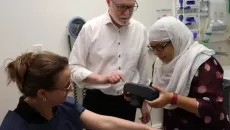Artificial Intelligence
Nursing and IT
An AI-powered frontline leaders platform has helped bring about a nearly 20% reduction in nurse turnover because leaders now have more time to build stronger relationships and step in sooner when someone is struggling, the chief nurse says.
FinThrive Chief Innovation Officer John Yount explains how agentic AI learns and can evaluate claims to make faster decisions to drive improved reimbursement.
The success of this program speaks to the promise of AI as a tool to help doctors make diagnoses, one researcher says.
AI & ML Intelligence
The Epic-integrated tech boosted automated medication instruction mapping from 26% to 86%. Further, the clinical-grade AI's ability to understand unstructured Rx instructions eliminated manual entry in an additional 60% of cases.
Some applications come out of the box "ready to go," says Yesha Patel, data scientist at Keck Medicine of USC. Others need a custom approach – but that requires a lot of in-house expertise, like data scientists and AI architects.
The AI, integrated into a hand-held point-of-care device, demonstrated 94% diagnostic accuracy.
"Despite the overwhelming strategic priority of improving patient and member experiences, most organizations lack the necessary infrastructure and data integrity to support it," Verato finds.
Success Stories & ROI
Mountain View Medical Center also says its new EHR, embedded with AI, has helped with a 63% increase in collections year over year and a 45.3% increase in charges posted – along with the addition of five more providers and 20 new staff members.
Remote Patient Monitoring
Remote patient monitoring provides a "digital bridge" to the patient's home, and AI acts as the intelligent assistant that makes sense of that connection and often overwhelming amount of data, says Dan Tashnek, CEO of Prevounce Health.
IT leaders play a critical role in breaking down the silos that hinder payer-provider execution of value-based care by championing robust data integration and interoperability, and leading joint technology and AI strategies, says one CEO expert.









